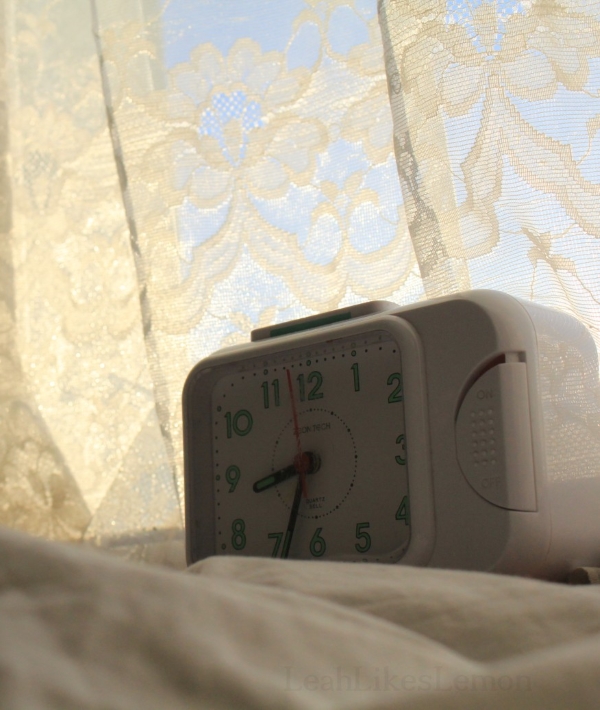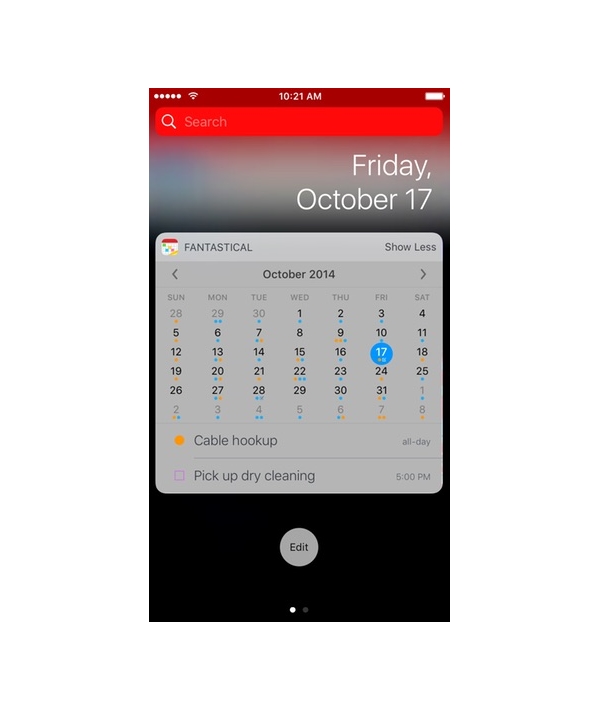Aim to Arrive Early, Not on Time

One of the major differences between chronically punctual and late people is how each group perceives earliness. Those who are on time will aim to get to a place earlier just in case anything goes wrong in the journey, while those who are late see being early as a waste of time and aim to get there almost just on time.
To switch this mentality, think of ways to make being early more valuable. You can use the extra 10 to 15 minutes to read, check emails or grab that much needed cup of coffee next door. Being early is being constructive.
Add 7 Minutes to Your Clock

Setting your clock forward by a few minutes can trick your brain into thinking you're later than you are. Yeah, you know you set it early, but sometimes it takes more effort to subtract time and figure out what the time really is than to just go with it and get moving.
Also be sure to set all your clocks to the same time in order to minimize confusion and preserve the illusion!
Write Down How Long Each Task Takes

A study from the University of Illinois published in the Journal of Experimental Social Psychology suggests that if you don't want to be late, enumerate. By breaking big projects into smaller tasks, you can more accurately calculate how much time it will take you to get things done.
For instance, instead of thinking it will take you about an hour to get ready in the morning, enumerate each task involved. Maybe it takes you 11 minutes to shower, 16 minutes to get the kids out of bed and dressed, 17 minutes to whip up breakfast, etc. For the first few weeks, write down how long it takes you to do even the simplest things. We know it's a pain (especially if you're already running late!) but it'll be worth it. Because once you break down the times, you'll see that your initial one-hour estimate might not be enough, and you'll get a more realistic idea of how much time you need to prepare.
Diana DeLonzor, author of "Never Be Late Again," says chronically late people are often off of their time estimates by 25 to 30 percent.
Always Give Yourself Buffer Time

Now that you know exactly how long it takes for you to do certain tasks, make it a habit to add some buffer time on top of that. You can't plan for everything, but you can give yourself the gift of more time in case something goes wrong. Greg McKeown, author of "Essentialism: The Disciplined Pursuit of Less" suggests adding 50 percent to your normal travel time to account of delays. It seems like a lot of time, but hey, when the earlier train you were supposed to take is delayed, you'll be grateful.
Map Out Your Trip

Knowing how much buffer time to give yourself gets easier if you map out your travels before you leave, especially if your meeting is at a new place. Make it a habit to look up the directions to the exact location, traffic conditions, alternate routes and even the weather ahead of time (raining in Los Angeles = complete gridlock) on Google Maps, Waze or your phone's map app. Add other destinations to your calculation too if you need to drop your kids off on the way or drop by the bank. Do the prep work to outwit traffic, and you'll forget you ever used, "Sorry, there was traffic" as an excuse.
Set an Alarm to Leave

Sometimes it's not enough to have just alerts for appointments on your calendar. It's just as important to end tasks on time than it is to start on time. So if you have back-to-back meetings or you know there's a morning rush to leave the house, set an alarm to alert you when it's time to leave, too. It's easy to lose track of time and this simple act can help you be more conscious of it.
Stop, Drop and Roll Out of There!

Many moms are guilty of the "just one more thing" mentality. "Just let me wash this up first" or "Taking out the trash will just take two seconds." No. Drop it. Remove "just" from your vocabulary and replace it with idea that "this can wait." What can't wait is the 10 a.m. appointment you promised you'd be at.
RELATED: The Importance of Getting Out of the House as a SAHM
Don't Overschedule

A huge reason for being chronically late is an over-packed schedule. We get it. Sometimes there's too much to do, and you can't help it, so each thing runs over into the next. And before you know it, you're late for everything! But other times there are commitments you didn't have to agree to do. Say no more often. You can't get everything done in a day.
When you feel overwhelmed, prioritize and stick to just one task at a time. A study from San Diego State University found that multitasking hikes up absences and tardiness. It's way easier to keep track of time if you're not stretching yourself thin in all directions.
Keep Your Keys in the Same Place

If you're often late because it takes you a few minutes to find your keys or wallet before you leave, start putting these necessities in the same place all the time. Once you get home, hang it on a DIY key hook or drop it in the same pocket of your purse. Routine makes everything run more efficiently, and when you need to leave in a jiffy, you'll save time because you know exactly where your things are.
Prep the Night Before

For many habitually late people, mornings are the worst. Don't get stuck in the morning rut and let it drag you down. Instead of leaving things you need to do for the next morning, finish it all the night before. Choose what you're going to wear, pack your bag and take out the trash before you go to sleep. If coffee is your morning fuel, try to get a coffee maker with a timer so you can prep your coffee the night before and your coffee will be ready in the morning when you are. Everything adds up, and the less you have to do right after you wake up, the less stressed you'll be.
Don't Snooze!

That saying, "You snooze, you lose" is pretty spot on. When you snooze, you lose more time and more focus. When your alarm rings, wake up immediately. Literally jump out of bed. Don't keep your eyes closed for an extra second or talk yourself into "one more minute." Studies show that after you hit snooze and drift off, your brain starts its sleep cycle all over again, and you'll most likely wake up again feeling even worse than you did the first time.
Keep Everything in One Central Organizer

Gone are the days of hastily scribbled Post-It notes and an unsystematic mix of digital and paper calendars. Make your life easier by picking one great option and record all your appointments, task times, locations and leaving alerts in one place. Try out task management apps like Fantastical 2, DigiCal or Week Calendar.
And don't leave inputting all the information to the last minute. Once you agree to an appointment, type it in!
Write Down Your Reason for Being Late

Every time you're late, take a moment out of the day to write down why you think you were late. It's hard to fix something if you don't know the root of the problem. Giving time for reflection can be a powerful thing and help reveal a pattern you didn't see before or small changes in your routine that you can make to make your days go so much smoother.
Find Out When You Do Your Best Work

When are you the most efficient? The most creative? The slowest? If you're an early bird, schedule the hardest things for the morning. If you're a night own, do tasks that require less energy in the day.
"People who schedule well are very aware of their energy cycles," Julie Morgenstern, author of "Time Management From the Inside Out" tells Real Simple. "They know what is the ideal time for different kinds of activities."
RELATED: I'm Not Sorry for Being Late
Find a New Source for Your Adrenaline Rush

Linda Sapadin, a psychologist who specializes in time management and author of "How to Beat Procrastination in the Digital Age," tells The Atlantic one main type of chronically late person is the crisis maker. In this case, your difficulties are psychological rather than technical. If you thrive off "the pressure and adrenaline rush of a time constraint in order to be productive," consider talking to a professional to find an adrenaline source that's healthier and more productive, for example channeling that rush into physical activities.
Make No Excuses

"Sorry I'm running late" and "Will be there five minutes late" won't absolve you from making others wait if you do it time and time again. Think of them as forbidden sentences now. True apologies come with an honest will to change. Instead, imagine how people feel when they're waiting and use that as motivation. You are valuing them by valuing their time.
Start Small

All of these tips can feel overwhelming. Start with one or two habitual changes, then once you've mastered those, go on from there. Change is cultivated one step at a time over a long period of time.
"You literally have to train your mind to approach things differently than its current default way of thinking—so you have to be ready to make that investment," Guy Winch, a psychologist and author of "Emotional First Aid" told The Atlantic.




